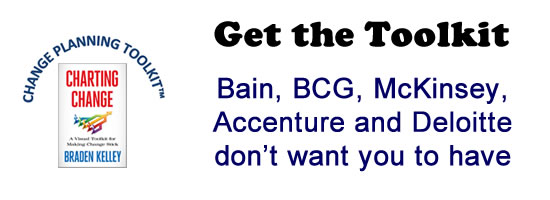Tony Robbins Says This One Trait is What It Takes to Succeed
A Trait that Bill Gates, Steve Jobs, and Richard Branson Share

Understanding the key to success is just the start of understanding what motivates you and those around you.
There is no one road to success. Each person’s path is different based on his or her individual context and circumstances. Trying to reduce success to a singular formula is something we do to entertain and lull ourselves into believing the myth that following a prescribed set of rules is all it takes. It’s actually just the opposite. If there’s one thing about success that I’ve learned, it’s that you need to be courageous, and at times foolish, enough to break rules that most people would prefer to follow.
But breaking rules involves risk: the risk of being punished, the risk of being outcast, the risk of loosing relationships, the risk of failure, financial risk, risking your health and well being. In fact, breaking rules can have a multitude of downside consequences. Which is why there is one trait shared by all successful people. Tony Robbins nailed it in a recent interview when he said,
“When people ask what it takes to succeed, the one answer I give them is ‘hunger.'”
Ah, but wait, if hunger is all you need to be successful then doesn’t that contradict what I just said about there being no one way to achieve success? No, because hunger is not the driver. In fact, according to one prominent psychologist, it’s actually the outcome of 16 separate desires, the combination of which is unique to every person. And I do mean unique because those 16 drivers result in more than two trillion unique profiles for what can motivate success.
We’ll come back to that and the research behind it in a minute, but let’s first talk about hunger.
What Exactly Are You Hungry For?
Hunger cannot be faked. You’re either hungry or you’re not.
When your belly is full your brain is complacent. In fact we are biologically wired to operate in a reduced state of creativity, innovation, and risk when we are satiated. Why expend energy when you don’t have to?
On the other hand, when you truly hunger for something, when your stomach or your soul feels empty without it, you will do just about anything to get it. In that ravenous state you set aside any concerns about appearing foolish, you discard the overwhelming odds against you, you get amazingly innovative, and you’ll bet everything you have to get whatever it is that will feed that hunger.
This is where it gets really interesting.
The reason success is so unique to each of us is that we don’t all hunger for the same things, in the same order of priorities. As a result we make a critical mistake; we assume that what drives us also drives others. By projecting our own hunger onto others, or by trying to adopt someone else’s hunger, we buy into the fallacy that everyone is motivated by the same combination of desires. Nothing could be further from the truth and more destructive to finding your own path to success or helping to motivate others on your team to find theirs.
So, are there really two trillion different types of hunger?
Two Trillion Ways To Succeed
Steven Reiss, a professor of psychology at Ohio State University has developed a theory of motivation based on studying the behaviors of 6000 people. His conclusion was that there are 16 basic desires which drive our behavior and create the sort of hunger that we’re talking about. Each of those desires can be ranked on a 0-5 scale to create a Reiss Profile.
There are over two trillion unique profiles and only one applies to you and reflects the things that you most need to get out of life. Notice I said “need” and not “want.” Because the best way to look at the unique combination of 16 desires that drive your hunger is to think about them as the things that you would most regret not having done or achieved in your life.
Understanding your unique profile and what drives you, as well as what drives others, is absolutely essential in motivating yourself and those you work with. Your profile defines your view of success.
While I can’t give you your profile in this context (The actual test is fairly involved, licensed, and interpreted in a way that’s similar to a Myers-Briggs.), you can get an initial and very cursory sense for your drivers by reviewing the Reiss list below and picking the top three desires that drive and define your unique view of success. (You can also get a somewhat better assessment at the end of Reiss’ book The 16 Basic Desires That Motivate Our Actions and Define Our Personalities)
It’s tough to prioritize these desires because they all exist to some extent in all of us, but be honest with yourself and pick the three that drive you the most. These are the ones that you are willing to break the rules for. Then order them in terms of priority.
The best way to do this is to pair the desires off and for each two ask yourself, “If I had to, which of these two would I trade for the other?” For example, Order and Saving are a tough one for me because I want both, but, as much as I hate to admit it, if I had to pick one it would be Saving. I have a very hard time letting go!
The key is to answer with what you actually desire versus what you think you should desire. Give it a try. The results may surprise you.
Here are Reiss’ 16 desires (There’s no significance in the order):
- Power is the desire to influence others.
- Independence is the desire for self-reliance.
- Curiosity is the desire for knowledge.
- Acceptance is the desire for inclusion.
- Order is the desire for organization.
- Saving is the desire to collect things.
- Honor is the desire to be loyal to one’s parents and heritage.
- Idealism is the desire for social justice.
- Social Contact is the desire for companionship.
- Family is the desire to raise one’s own children.
- Status is the desire for social standing.
- Vengeance is the desire to get even.
- Romance is the desire for sex and beauty.
- Eating is the desire to consume food.
- Physical Activity is the desire for exercise of muscles.
- Tranquility is the desire for emotional calm.
Now that you’ve identified the three desires that drive you the most, the ones that are the source of your hunger, you might be tempted to stop and think about why these are so critical to your success. That’s a wonderful exercise in self-awareness, but it is pretty useless. These desires are so deeply rooted in your psyche that it will take nothing short of the emotional equivalent of a direct nuclear hit to dislodge them. I’m not saying that you shouldn’t re-evaluate what drives you, but it’s exceptionally rare that these drivers change after very early in a person’s formative years.
Clearly some of these desires also cut both ways. Vengeance, for example, doesn’t come across as a very noble desire. And yet, in a competitive scenario, you can easily see how it might play a pivotal role in motivating someone to be ruthlessly creative.
So, now ask yourself if what you are doing on a day-to-day basis is feeding those desires. The degree to which you do that is what gives your life meaning.
What’s most important in understanding your unique desires is accepting the obligation you have to yourself to do everything you can to align your life with them. The more you do that the more fulfilled and meaningful your life will feel. People who are truly successful pay close attention to these core desires and do whatever they can to satisfy them. Simply put, they don’t ignore their hunger.
This is your unique path to success, it’s what drives you and what fulfills you, it’s what most feeds your hunger. Not everyone will understand it, in fact, chances are two trillion to one that that they won’t.
Image credit: TheBahamasInvestor.com
This article was originally published on Inc.
Wait! Before you go…
Choose how you want the latest innovation content delivered to you:
- Daily — RSS Feed — Email — Twitter — Facebook — Linkedin Today
- Weekly — Email Newsletter — Free Magazine — Linkedin Group
 Tom Koulopoulos is the author of 10 books and founder of the Delphi Group, a 25-year-old Boston-based think tank and a past Inc. 500 company that focuses on innovation and the future of business. He tweets from @tkspeaks.
Tom Koulopoulos is the author of 10 books and founder of the Delphi Group, a 25-year-old Boston-based think tank and a past Inc. 500 company that focuses on innovation and the future of business. He tweets from @tkspeaks.
NEVER MISS ANOTHER NEWSLETTER!
LATEST BLOGS
Credit Card Shenanigans
It must be great to be in the credit card business in the United States. Demand is relatively inelastic and regulation is lax, so you can charge whatever you want for an interest rate, increase your fees once or twice a year, and make additional money off cash withdrawals and foreign exchange transactions.
Read MoreBuilding an Experience
As people become ever more immune to traditional advertising and marketing, branding will become more important. Branding is all about building an emotional connection with customers. Making the decision to follow a strategy focused on building a brand is not without peril, however, as it means that you will have to choose to not do certain things, like pursue a low price strategy.
Read More- « Previous
- 1
- …
- 4,132
- 4,133
- 4,134




